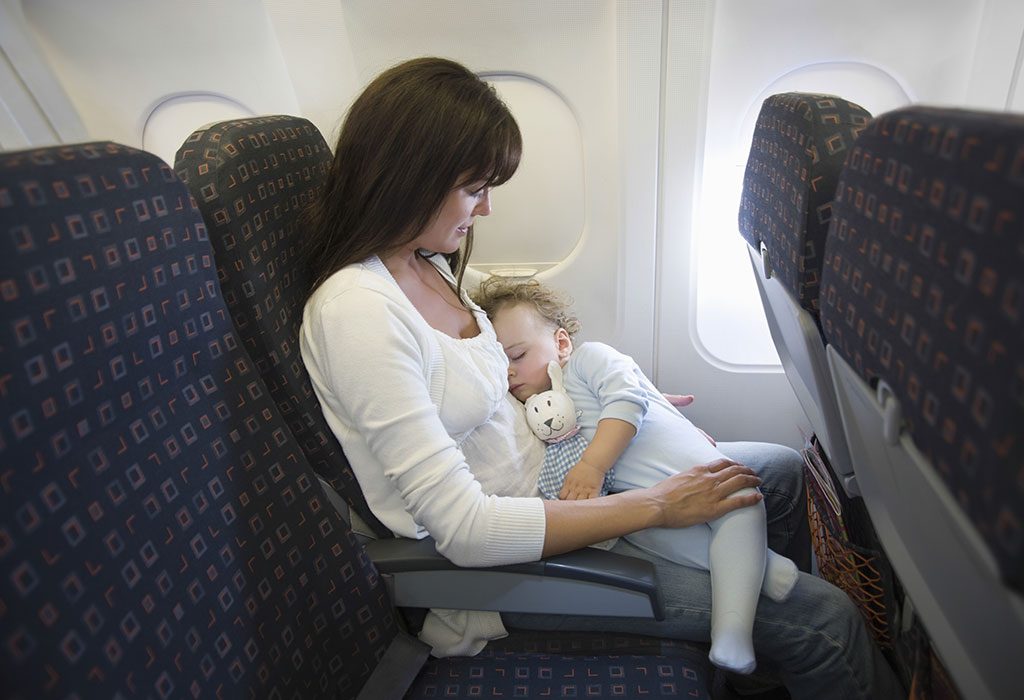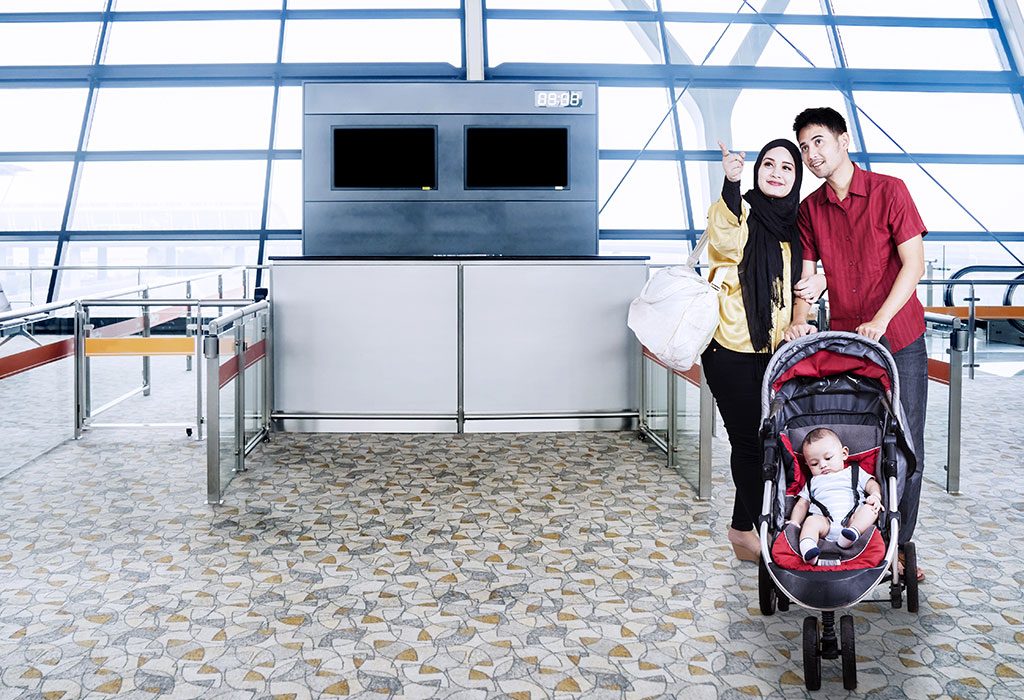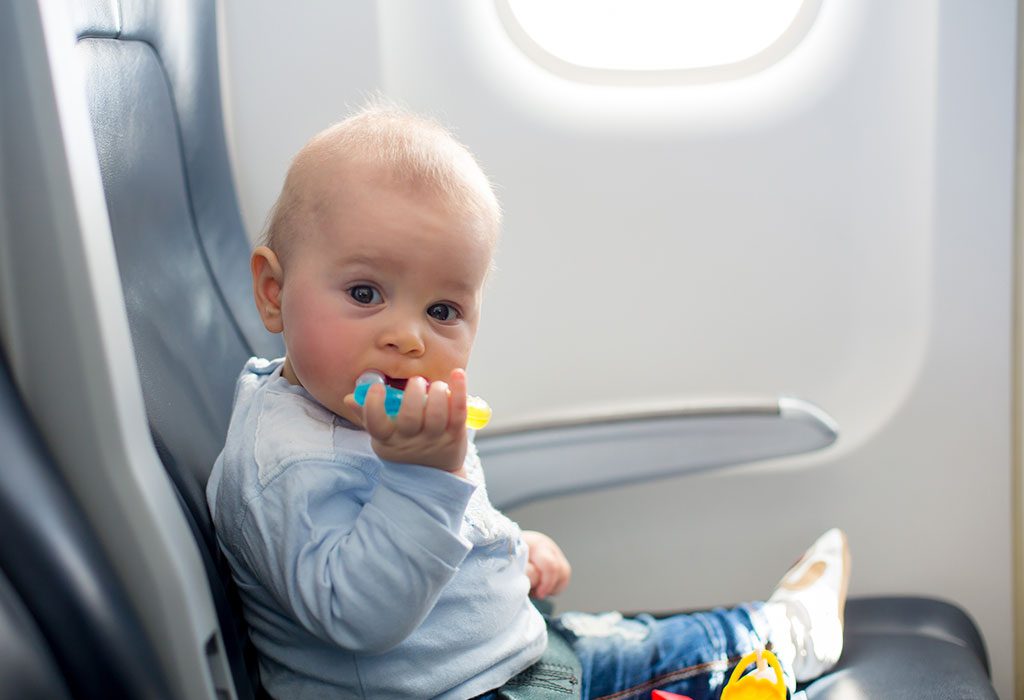Is the thought of travelling by air with your baby giving you nightmares? There is no doubt that travelling may make your baby behave differently but there is no need to hit the panic button. If you plan well, travelling may turn into a fun experience for both you and your baby. If you are thinking about the probability of this happening, we recommend that you browse through the following article to know how you may plan your air travel with your baby.
10 Things To Consider While Flying With A Baby
What all you should do or not do while travelling with a baby on a plane? Well, here we have compiled a checklist or tips for flying with an infant that may make your air travel not only hassle-free, but it may become more convenient for both you and your baby.
1. The Age Of Your Baby
It is essential to consider this fact before you plan any air travel with your baby. Newborn babies may settle quickly as they spend most of their time sleeping. However, slightly older babies (2-4 months old babies) may not have a set feeding and sleeping schedule, which may create trouble for you. Therefore, if you are planning to travel by air make sure your baby is of an age, where he is easily manageable by you.
2. Extra Baby Supplies For The Plane
Make sure you pack enough diapers, wipes, burp clothes, changing clothes and other such baby supplies with you. Also, keep a small blanket or a sweatshirt for your baby to keep him warm during the flight. Pack smartly so that you do not fall short of anything as babies are unpredictable and you can expect anything from them.
3. Try Getting A Window Seat

It will be a good idea to book a window seat in advance. It will not only give you a little privacy while feeding, but you can also use the window to lean on for extra support and resting. Also, you will be in control of the amount of light you want as it will be a lot easier for you to close and open the window shutter. And some babies enjoy looking out of the window.
4. Feed Your Baby During Takeoff And Landing
Just the way adults feel the ear pain due to change in pressure, during takeoffs and landings, babies experience the same. This may make them cry incessantly. However, to avoid this embarrassing baby-howling session, you should feed your baby because the actions of sucking and swallowing help keep ear pains at bay.
5. Plan Your Travel Around Your Baby’s Nap Time
The best part about air travels in that you spend less time in travelling, and if your baby is at an age where he has set sleeping patterns, you might just have a solution for your travel woes. Plan your travel at a time that is close to your baby’s nap time. This way your baby may spend most of his travelling time sleeping, which means minimum hassle for you.
6. If Possible Bring A Travel Companion

There is no denying that babies are demanding and need constant care when travelling. All this caring can make you feel exhausted. Therefore, it is a good idea to have a companion on board when you are travelling with an infant. Just imagine how hard it will be to take a bathroom break if you are travelling all by yourself? Tricky, isn’t it? Therefore you should try to get a travel companion with you to feel more relaxed and comfortable while travelling.
7. Pack Extra Clothes For Yourself
You may find the idea quite funny but believe it or not, you may need it. Travelling may make your baby poop, pee or even throw up more than usual and sometimes your clothes may get soiled too. If you wish to travel all stinky and dirty then probably you may skip packing an extra pair of clothes for yourself. However, we recommend otherwise.
8. Your Baby’s Travel Gear
Travelling light is not something you can execute with a baby because when it comes to babies, comfort takes priority. However, you may plan to check-in your baby’s stroller, pram, car seat or other such bulky items beforehand and most airlines may not even charge for it too. Also, if you are taking any travelling gear on-board with you, you may request the airlines to help you, board, first.
9. Pack Your Baby’s Favourite Toys

If your baby is at an age where he loves to play with toys, then it will be a good idea to pack toys for your baby when you are planning air travel. This way your baby will not only feel entertained and amused on the flight, but he will not trouble you much. However, do not pack toys that make loud noises or sounds as they may disturb the fellow passengers. Also, carry few toys as babies are usually clumsy while holding toys and may drop it on the floor and you would not like your baby to play with a toy that is get infected with germs.
10. Be Prepared To Nurse Often
There is nothing more soothing and comforting for a baby than a breastfeeding experience. By this, your baby is not only filling his tummy, but the close contact with the mother helps your baby feel protected, more so during travelling. Therefore, wear a comfortable top and bra which will make it easy to manage to feed. If your baby takes formula milk, you should pack enough sterilised bottles, formula and warm water to prepare milk for your baby. Sometimes airlines provide warm water too, but we suggest carrying water on your own for health and hygiene reasons. It will also be a good idea to carry a pacifier for your baby because it may not be hungry, but just the sucking instinct that your baby may be looking forward to satiating and under such situations, pacifiers work best.
Those mentioned above are some tips that will help you travel on a flight with a baby. However, if it is not that urgent or necessary, we recommend that you postpone your air travel plans until your baby is six months of age. This is because by that time your baby’s sleeping, feeding and toilet schedule will be more organised and it will become a lot easier for you to manage your baby on board. However, if you wish to travel before that, we recommend that you consult your doctor for the same. Your doctor will check your baby’s health and will also tell you how you can effectively manage your baby on the flight.









